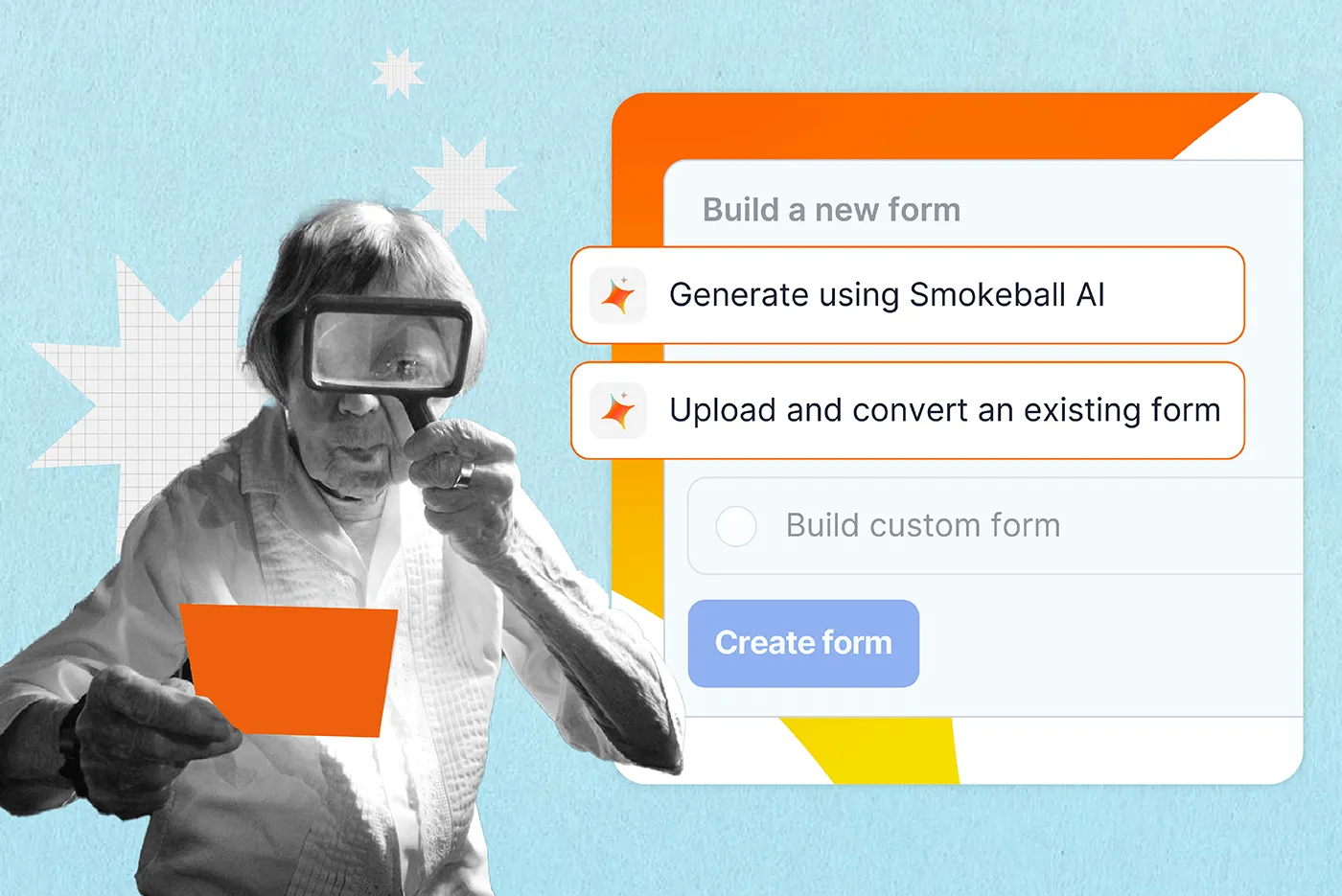The Future of Law: AI for Legal 101 (Part 1)
Written by
|
January 10, 2025
Written by Smokeball
|
January 10, 2025

Written by Jordan Turk
|
January 10, 2025

Artificial Intelligence (AI) is fundamentally changing the legal field by streamlining manual tasks and enhancing overall efficiency. This transformation is impacting lawyers, court procedures, clients, legal education, and the future dynamics of legal practice. It is essential for legal professionals to remain informed about advancements in AI and to develop the necessary skills to utilize AI effectively. As AI technology progresses, it is vital to weigh its advantages against potential risks and ethical considerations.
Demystifying AI
AI has become one of the most talked-about technologies in recent years, acting as a game-changer for businesses — similar to the transformative impact we experienced with the rise of cloud technology. And, yet, you should simply consider AI as your hardworking, talented, and enthusiastic assistant, always ready to support you.
This is not just a tool that helps identify and document facts; it recognizes patterns, forecasts outcomes, and creates content that fits the context. AI is designed to enhance our cognitive abilities, allowing us to handle vast amounts of information at a level and pace that would be unachievable otherwise, thus making us more efficient and effective.
Pretty incredible, right? But let's not get ahead of ourselves. It's important to first gain a solid understanding of what AI truly is and how its capabilities can genuinely benefit us in the legal field.
Is All AI the Same?
Many people conflate AI with other types like generative AI, machine learning, and deep learning. However, AI is a broad field focused on developing computer systems that can perform tasks typically requiring human intelligence, such as visual perception, speech recognition, decision-making, and language translation.
Generative AI, a specific subset of AI, refers to the capability of these systems to create new and original content—like text, images, videos, or audio—often in response to specific prompts. Meanwhile, machine learning (ML) and deep learning (DL) are interconnected disciplines that represent different layers of data processing and automation. ML, a subset of AI, involves algorithms that learn from data to make predictions or decisions without being explicitly programmed for each task.
In the legal space, however, AI takes on a unique role that is not just about automating basic tasks. It directly impacts lawyers, clients, court proceedings, and even legal education. For instance, AI can help lawyers streamline document review, predict case outcomes based on historical data, and assist in drafting legal documents with greater efficiency.
Legal education is also evolving, with AI-driven tools aiding in research, legal analysis, and practical skill development. These tools can quickly process vast amounts of legal information, helping students and professionals find relevant case law, analyze statutes, and even predict case outcomes based on historical data.
By streamlining these processes, AI enables more efficient learning and deeper understanding of complex legal concepts. AI is a wide-ranging idea, but when it comes to the legal field, it has a unique role. It brings fresh opportunities to enhance legal practices, make justice more accessible, and boost efficiency in legal education.

What about ChatGPT?
When people think of "AI," ChatGPT is often the first tool that comes to mind. Since its debut in 2022, ChatGPT has quickly emerged as one of the most talked-about subjects in the technology sector and beyond. This application, now one of many available, enables users to engage in conversations with a virtual assistant on a wide range of subjects, from history and sports to literature and the arts. However, like any tool, ChatGPT and similar platforms have their drawbacks.
Its replies are derived from the data it was trained on up until a specific date, meaning it may not be up-to-date with the latest news or developments. While it can produce contextually relevant answers, it doesn't "comprehend" information in the same way humans do. It shouldn't be seen as a replacement for professional legal expertise or the deep understanding that an experienced lawyer possesses.
Embracing AI
AI is gaining significant traction in the legal profession, with 64% of firms using extractive AI technologies for legal research in 2019. Unlike generative AI, which creates new content, extractive AI focuses on analyzing and extracting information from existing documents, helping legal professionals quickly gather relevant data to inform their work.
A Thomson Reuters survey revealed that 77% of firms viewed efficiency and time savings as top benefits. In April 2023, 82% of lawyers believed ChatGPT/generative AI could be applied to legal work. However, only 3% of respondents were using generative AI, and 34% were still considering its use. In 2023, international law firms Allen & Overy and PricewaterhouseCoopers partnered with Harvey AI to automate legal document drafting and research.
In June 2023, Thomson Reuters acquired legal tech startup Casetext for $650 million, LexisNexis released a tool backed by AI, and AI legal tech startup DraftWise raised $5 million. AI has the potential to revolutionize various sectors, including the legal field, but it's essential for legal professionals to approach it positively and understand its advantages and limitations.
It’s not merely about using technology; it’s about rethinking how law is practiced to assist more individuals and achieve superior results. Welcome AI into your practice, and let it elevate your work, enabling you to concentrate on what you excel at—delivering outstanding legal services to your clients.
What about AI replacing human jobs?
Misconceptions about AI, like it replacing human jobs or guaranteeing accuracy, are misleading. AI is a tool designed to enhance human capabilities, not replace them. At Smokeball, we understand that AI requires human intelligence to be truly effective. Rather than replacing jobs, AI enhances them by automating up to 70% of the time spent on repetitive tasks, significantly boosting productivity in the legal sector.
Learn more about why lawyers choose Smokeball or schedule a no-obligation demo with an expert today.
“AI won’t replace you, but those who use it will soon eclipse those who don’t.
— Hunter Steele, Smokeball CEO
While some may fear that AI could consolidate roles, we believe its true purpose is to support and augment human efforts. For instance, as we explore ways to integrate AI into our operations, we recognize that positions like collections managers, controllers, and operations managers remain essential. These roles are vital for interacting with AI, allowing our team to operate more efficiently and scale faster.
By leveraging AI to handle mundane tasks, we empower our employees to concentrate on higher-value, strategic initiatives that foster growth and innovation. At Smokeball, we’re committed to harnessing the power of AI to enhance the work of legal professionals, ensuring that technology and talent work hand in hand.

Smokeball’s Legal Software Solution
Smokeball AI is dedicated to improving your productivity, streamlining workflows, and enhancing efficiency within your legal practice. Numerous successful law firms depend on Smokeball's AI-driven legal practice management software to boost their long-term profitability.
Explore the distinguishing features that set Smokeball apart from its competitors:
- Crafted by attorneys for attorneys
- Backed by cutting-edge cloud technology
- Cultivates a vibrant community
RELATED: Download Smokeball Overview Brochure
How Smokeball AI Can Transform Your Legal Practice
While some may view AI as a potential threat, it actually presents a remarkable opportunity for the legal profession. By utilizing AI's capabilities, legal practitioners can elevate their roles, expand their service offerings, and create greater value for their clients and society as a whole.
Smokeball's AI software, tailored for law firms, includes a comprehensive suite of powerful tools that are seamlessly integrated with familiar functionalities, utilizing the advantages of generative AI securely within the Smokeball framework.
Recognized as a leading practice management software by G2, Smokeball delivers outstanding features, exceptional service, and significant outcomes. Join the multitude of law firms that are experiencing enhanced productivity and profitability.
Don’t stop now!
Part 2 of our blog series on "The Future of Law: Legal AI 101" is just a click away. Join us as we uncover more about the incredible advancements in legal AI and what they mean for the future! Read now.
Learn more about Smokeball document management for law firms:
Book Your Free Demo
Ready to see how Smokeball client intake software helps you Run Your Best Firm? Schedule your free demo!










%20(1).webp)





